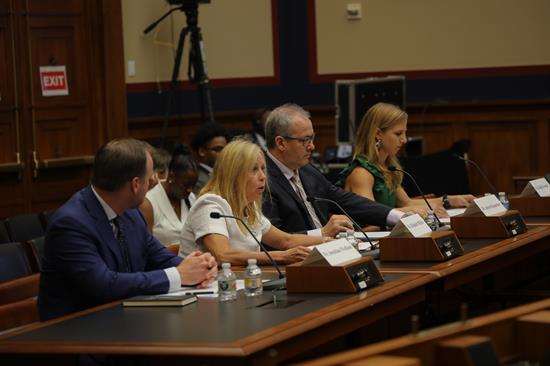E&W Blog
Hearing Recap: Wage and Hour Division EditionSubcommittee on Workforce Protections
WASHINGTON, D.C.,
July 18, 2023
Today’s Workforce Protections Subcommittee hearing covered the Department of Labor’s (DOL) Wage and Hour Division (WHD) and its repeated failure to comply with accountability mechanisms enshrined in the law. The hearing was led by Chairman Kevin Kiley (R-CA), who started by outlining the dire straits of the American economy under the Biden Administration. “After two and a half years of unprecedented spending and unconstrained regulation, 90 percent of Americans remain worried about high prices and 88 percent are worried about the future of the economy,” Kiley declared. He then grounded public opinion in economic reality, stating that “58 percent of Americans are living paycheck-to-paycheck and 70 percent are stressed about their finances. The bottom 50 percent of American households need to earn $5,000 more this year just to have the same purchasing power they did in 2019.” The hearing unfolded into a discussion of the role of regulators in this somber economic state of affairs, featuring a distinguished witness panel with three Republican-invited experts: Jonathan Wolfson, Chief Legal Officer and Policy Director for the Cicero Institute; Elizabeth Milito, Executive Director of the National Federation of Independent Business Small Business Legal Center; and Rachel Greszler, Senior Research Fellow at The Heritage Foundation. In his opening statement, Jonathan Wolfson highlighted the unique role of regulators in a constitutional republic, warning, “But unlike legislators, regulators can only act under authority from federal statutes and regulators also are disconnected from voters so it is difficult for the public to hold them accountable for bad regulations.” Because of the quasi-legislative role of regulators, it’s paramount they adhere to accountability mechanisms passed by Congress, like the Regulatory Flexibility Act (RFA). This theme rang true throughout the hearing, as witnesses identified specific transgressions of Biden’s regulatory army. In her opening statement, Elizabeth Milito jumped to the defense of small businesses unfairly harmed by unaccountable WHD regulators. “The intent of the RFA was clear – when promulgating regulations, federal agencies must consider and minimize the impact of rules on small business. However, in the 40-plus years since the RFA became law, agencies have found ways to disregard or bypass many of the RFA’s requirements.” Under the Biden administration, small businesses have received historically poor treatment. So much for Biden’s professed “engines” of our economy. Moving to the Q&A session, Rep. Glenn Grothman (R-WI), emphasized the harm done to small businesses by overzealous regulators, identifying the independent contractor rule as a prime example. The rule would have a devastating impact on the economy and limit individuals’ ability to work how they want. DOL claims the compliance costs and administrative burdens cited in the proposed rule are a mere 30 minutes and less than $25 for small businesses. But as Wolfson points out, many of DOL’s estimates are based on “hoped-for policy outcome[s] and have no foundation in a detailed economic analysis.” Following Rep. Grothman, Chairwoman Virginia Foxx (R-NC) moved from the independent contractor rule to the proposed David-Bacon Rule. The rule is over 100 pages and imposes significant burdens on construction-related businesses. “WHD absurdly estimates that its proposed rule will cost $78.97 to comply annually, including one hour to read the regulation and one-half hour to implement the regulation,” stated Chairwoman Foxx. She then posed the question of whether this estimate accurately reflects compliance costs for small businesses. “It’s going to hit small businesses the most. Eighty-two percent of all construction firms employ under 10 employees,” responded Milito. She continued, “I think DOL should withdraw the rule because their analysis was so flawed.” Furthermore, Rep. Eric Burlison (R-MO) showed concern for the Davis-Bacon rule and how it fits into Biden’s larger regulatory scheme. He concluded the hearing by asking, ultimately, “The increased cost, who pays that?” To which, Rachel Greszler replied, “Well the division [WHD] does point out that a lot of these costs will just be passed down to the federal government.” The federal government … also known as the taxpayer. With the American economy reeling from Biden’s heavy-handed policies, the last thing taxpayers need is another bill. Bottom line: The Committee is fighting Biden’s regulatory army on behalf of taxpayers, small business, and everyday working Americans. |

